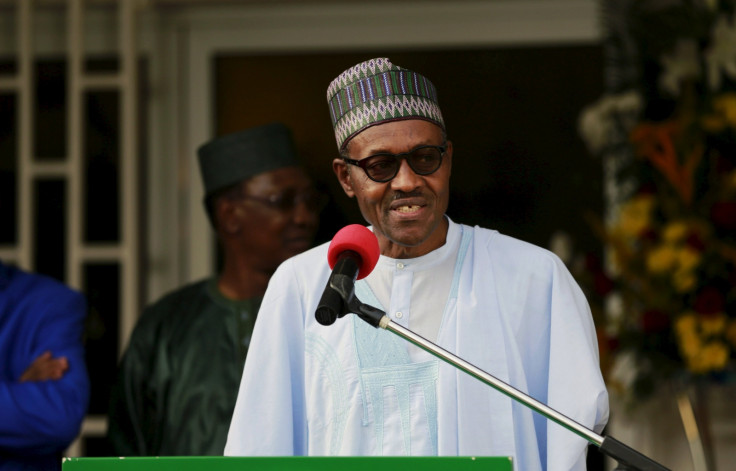Nigeria stolen funds: Buhari announces investigation on banks but 'more has to be done'

Nigeria's President Muhammadu Buhari has announced the government is working to identify banks and countries where stolen funds had been lodged. The move comes a few weeks after the leader vowed he would do whatever he can to recover millions of dollars he alleged were stolen during previous administrations.
Buhari, 72, was elected in March defeating incumbent leader Goodluck Jonathan. During his electoral campaign, he promised, among other things, to eradicate corruption and terrorism. According to some analysts, Buhari's reputation of anti-corruption leader, which he obtained during his first presidency (1983-1985) and his career in the army, gained him thousands of votes.
After being elected, the former army general reportedly banned 113 vessels from lifting crude oil from some 27 Nigerian ports amid suspicions the vessels had been implicated in illicit activities. He also announced he would appoint new cabinet members in September as fighting corruption is his main priority.
Nigeria
Capital: Abuja
Population: 174,507,53 (2013 census)
Largest cities: Lagos, Kano, Abuja
Major ethnic groups: 21% Yoruba, 21% Hausa,
18% Igbo
Languages: English, Hausa, Igbo, Yoruba
Religion: 50% Muslim, 40% Christian, 10% other
Currency: Naira (N) 1N = £0.0033; US$0.0050
During a meeting with US congress representatives in the capital Abuja, the leader said Nigeria is receiving help from the international community in its anti-corruption fight. He was quoted by the Premium Times as saying: "We are getting cooperation from the international community, including information on ships that take crude oil from Nigeria and change direction, or pour their contents into other ships mid-stream.
"Some monies were paid to individual accounts. We are identifying the financial institutions and countries that are involved. I have been assured that when we get all our documents together, the US and other countries will treat our case with sympathy."
In July, US President Barack Obama revealed the idenitity of alleged Nigerian oil thieves after meeting with Buhari to discuss cooperation on Nigeria's fight against corruption and terror group Boko Haram.
In 2013, the head of the Central Bank of Nigeria (CBN), Sanusi Lamido Sanusi, was suspended after he claimed that $20bn (£12.8bn, €18bn) of oil revenue "went missing" from Nigerian National Petroleum Corporation (NNPC).
In a letter to Jonathan, Sanusi said: "I am constrained to formally write your excellency, documenting serious concerns of the CBN on the continued failure of the NNPC to repatriate significant proportions of the proceeds of crude oil shipments it made in gross violation of the law."
The allegations triggered an investigation into NNPC books. According to the audit, released in April, NNPC overpaid the state by almost $750m, but had to still pay an additional $1.5bn.
Nigeria's 'corruption is endemic'
Oliver Ezeala, leader of Voice Of The Voiceless, a movement that aims to tackle corruption in Nigeria, welcomed Buhari's moves but warned more has to be done as corruption is present in all sectors of the country's society.
"Corruption is no doubt endemic in Nigeria," he told IBTimes UK. "It is difficult to pin down the reason for our corrupted tendencies to one factor. It [corruption] has made many [people] suddenly affluent while the poor are further impoverished. In other sense, it affects the running of a system which is now noted for favouritism, nepotism and avarice. All these are reflected in our national lives and it does indeed affect us negatively.
"While we are confronted by a parlous state of our economy, we have not lost sight of the failure our governments to diversify our economy and stop the mono-crop economy which has long [been] dependent on the now crumbling oil in the international market," he continued. "Leaders have been short-sighted by the abundance from oil revenue that they closed the potentials derivable from commercially exploitable solid minerals."
Olayemi Akande, a prominent Nigerian blogger based in Lagos, is confident Buhari can eradicate corruption. "I believe he [Buhari] can tackle corruption, he did that when he was a military president and that's part of the reason he was voted for this time," she told IBTimes UK.
"He is apparently tackling it now: The rigorous process of electing members of his cabinet, seeking international help to get back the loot. All what he's being doing so far shows he is out to root out corruption starting from the federal government level. We are very glad and hopeful that funds meant for development of the country and its citizens will not be mismanaged or embezzled."
Nigeria up close: Check out our Flipboard magazine
© Copyright IBTimes 2025. All rights reserved.






















